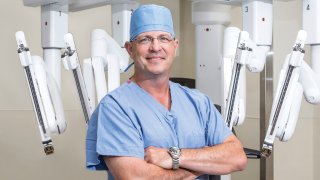

The following content is created in partnership with Virginia Hospital Center. It does not reflect the work or opinions of NBC Washington's editorial staff. Click here to learn more about Virginia Hospital Center.
At age 83, Hazem El Beblawi, had never undergone a colonoscopy. But given his symptoms, his doctor thought it best to prescribe the procedure. The result: The test showed a mass. Consequently, his physician referred Beblawi to Rodolofo Pigalarga, MD, a physician in the Virginia Hospital Center Group—Colorectal Surgery at Virginia Hospital Center.
“Hazem had an obstructing, perforated cancer which required emergency surgery,” says Pigalarga. “Through traditional open surgery, we performed a partial colectomy to remove the tumor, and then added a colostomy bag. Fortunately, the cancer was in an early stage and had not spread. Surgery was the only treatment he required.”
We're making it easier for you to find stories that matter with our new newsletter — The 4Front. Sign up here and get news that is important for you to your inbox.
“Dr. Pigalarga is a wonderful doctor, always smiling,” says El Beblawi. “Everything went well, and I was able to go on a business trip only two months after surgery. I felt good, but with the colostomy bag, I just didn’t feel normal.”
Four months after surgery, Hazem came back to Virginia Hospital Center for a reverse colostomy procedure. This time, Dr. Pigalarga was able to perform minimally invasive surgery using the da Vinci XI surgical robot, the most advanced robotic surgical system available. The da Vinci’s instruments rotate 360 degrees, enabling the surgeon to navigate turns that human hands cannot manage.
“Reversing a colostomy is one of the hardest operations we do because of scar tissue and limited visibility of vital structures,” Pigalarga says. “With complex colorectal surgery, robotic surgery techniques are clearly an advantage. For Hazem, we did not have to reopen the midline incision from the first surgery; instead, we operated through a few tiny incisions. The da Vinci XI provides better visualization and control, which translates into better outcomes for our patients.”
“Colorectal surgery at Virginia Hospital Center is exceptional because we offer customized treatment options and the newest minimally invasive surgical interventions possible,” says Craig Rezac, MD, FACS, FASCRS, a physician of Virginia Hospital Center Group—Colorectal Surgery and chief of Robotic Surgery at Virginia Hospital Center. “At most hospitals, colostomy reversals are performed as open surgery procedures,” Rezac notes. Here at Virginia Hospital Center, with our expertise and advanced technology as an accredited Center of Excellence for Robotic Surgery, 86 percent of our reversals are performed robotically.”
El Beblawi’s stay in the hospital lasted only three days following his colostomy reversal, thanks to the robotic surgery. Open surgery would have required a significantly longer stay. Now he’s back to his normal, busy life. “My experience at Virginia Hospital Center was first class,” he says.
Get Screened to Prevent Colorectal Cancer. March is Colorectal Cancer Awareness Month. The American Cancer Society has lowered the recommended age for screening people who are at average risk for colorectal cancer to age 45. Colonoscopy is the gold standard for colorectal cancer screening. It is highly accurate in detecting polyps in the intestines, which can be removed before they become malignant. Click here for more information and to find a physician at Virginia Hospital Center.

